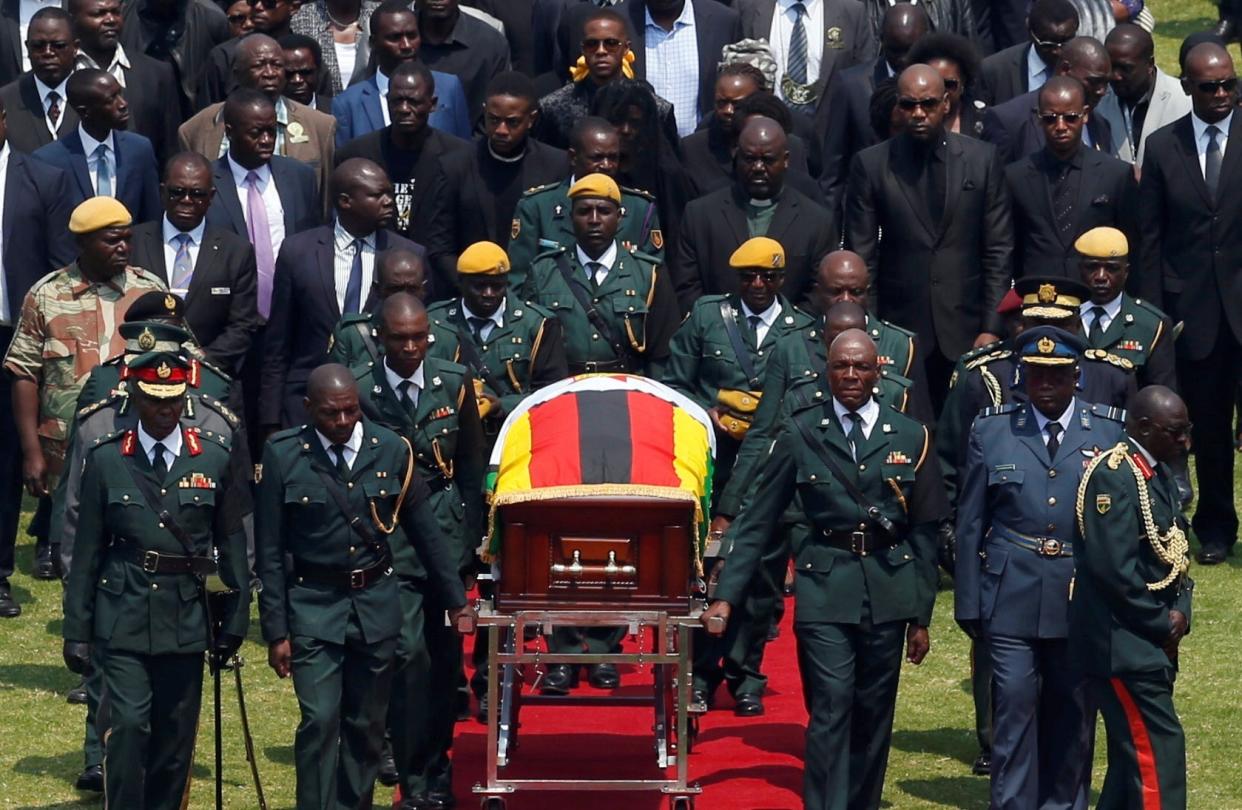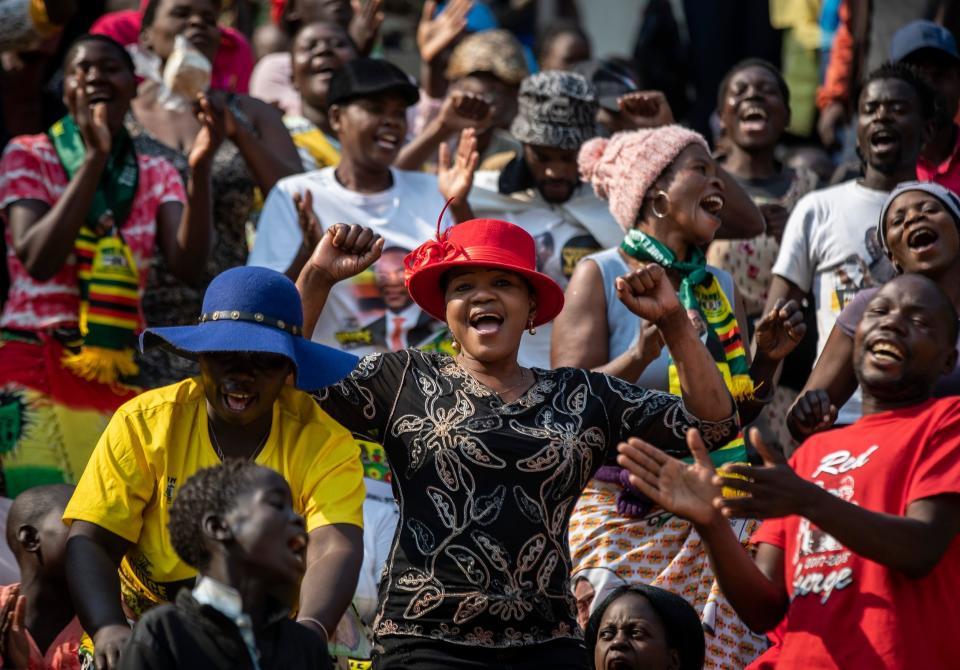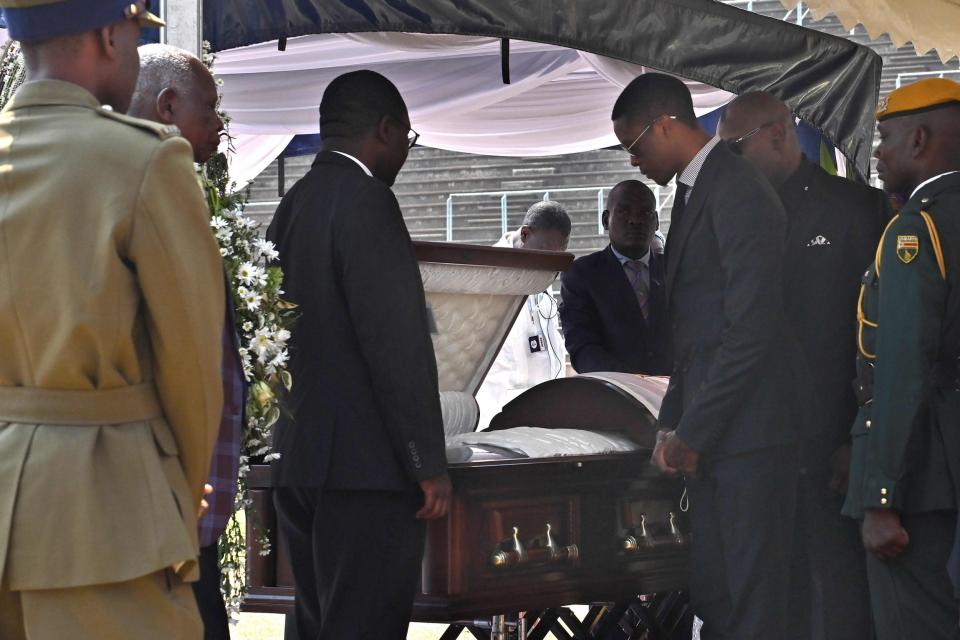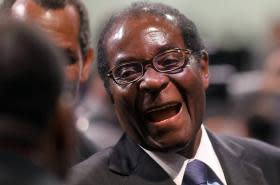Robert Mugabe death: African leaders gather in Zimbabwe for state funeral

Leaders from across Africa have gathered at the funeral of Zimbabwe’s former president Robert Mugabe.
Heads of state, including South African president Cyril Ramaphosa and Kenyan president Uhuru Kenyatta, joined in the Zimbabwean capital Harare to pay their respects to the notorious ruler.
Mourners danced, sang and wept as his coffin, draped in the country’s flag, was paraded through the national sports stadium to the sound of a military band.
Mugabe, who ruled Zimbabwe for 37 years until he was ousted by his own army in November 2017, died in a Singapore hospital a week ago, aged 95.
His former deputy Emmerson Mnangagwa, who conspired to topple him and now serves as president, tweeted on Saturday: "Today, let us put aside our differences and come together as we remember the past and look to the future as one proud, independent and free nation.”
Today, let us put aside our differences and come together as we remember the past and look to the future as one proud, independent and free nation.
— President of Zimbabwe (@edmnangagwa)
Ahead of the state funeral, banners reading "Hamba kahle, Gushungo," ("go well, Gushungo" - in reference to Mugabe's clan name) and "pioneer of nationalist politics" were draped across the 60,000-capacity stadium.
Guests from other African nations included Equatorial Guinea president Theodore Obiang Nguema, who was set to deliver a speech at the stadium.
Mr Obiang, who has ruled his own country for 40 years, described Mugabe as "a leader without comparison on the African continent".
He praised the former leader’s controversial policy of seizing white-owned farms, saying: "The people of Zimbabwe will forever be grateful that he took land from the whites and gave it to his people.”

One local worker Cleo Mapuranga, who is catering at Saturday’s event, said he would remember Mugabe for this legacy.
"I feel low because Mugabe fought for us,” he told Reuters.
“I remember him for land to the blacks, economic freedom and higher education which was non-racial.
"Now, people are suffering. No one is controlling the prices in the shops. Our finance minister is trying to implement first-world policies which don't work in third-world countries."
http://players.brightcove.net/1348423965/default_default/index.html?videoId=6083974960001
A look at Robert Mugabe's 37-year rule of Zimbabwe
President Mnangagwa's government has taken steps to cut the budget deficit, remove subsidies on fuel and power and repeal laws curbing public and media freedoms.
But those reforms and austerity measures have compounded ordinary people's hardships.
Many people in Harare were less ready to praise their late ruler.
One Zimbabwean resident told AFP: "We are happier now that he is gone. Why should I go to his funeral? I don't have fuel.
"We don't want to hear anything about him anymore. He is the cause of our problems."
Mugabe was Zimbabwe's first leader after the country became independent in 1980.
During his early years, he was praised for broadening access to health and education for the black majority and feted as a champion of racial reconciliation.

But his later years were marked by the violent and bloody repression of his political opponents and Zimbabwe's economic ruin.
He held on to power for almost four decades before being ousted in the 2017 coup.
By the time he was toppled - to wild celebrations across the country of 13 million - he was viewed by many at home and abroad as a power-obsessed and corrupt autocrat.
Read more
How crowds danced in the streets when Mugabe's bloody reign ended
He will be buried in the National Heroes' Acre monument in Harare in around 30 days, his nephew said on Friday, following a week-long row with the government over his final resting place.
President Mnangagwa and the ruling ZANU-PF party argued he should buried at the national monument, but some relatives, expressing bitterness at the way former comrades had ousted Mugabe, had pushed for him to be taken back to his home village.
Over the next month, a special mausoleum will be built at the existing Heroes' Acre to hold his remains.
Read more
Read more How crowds danced in the streets when Mugabe's bloody reign ended

 Yahoo News
Yahoo News 

